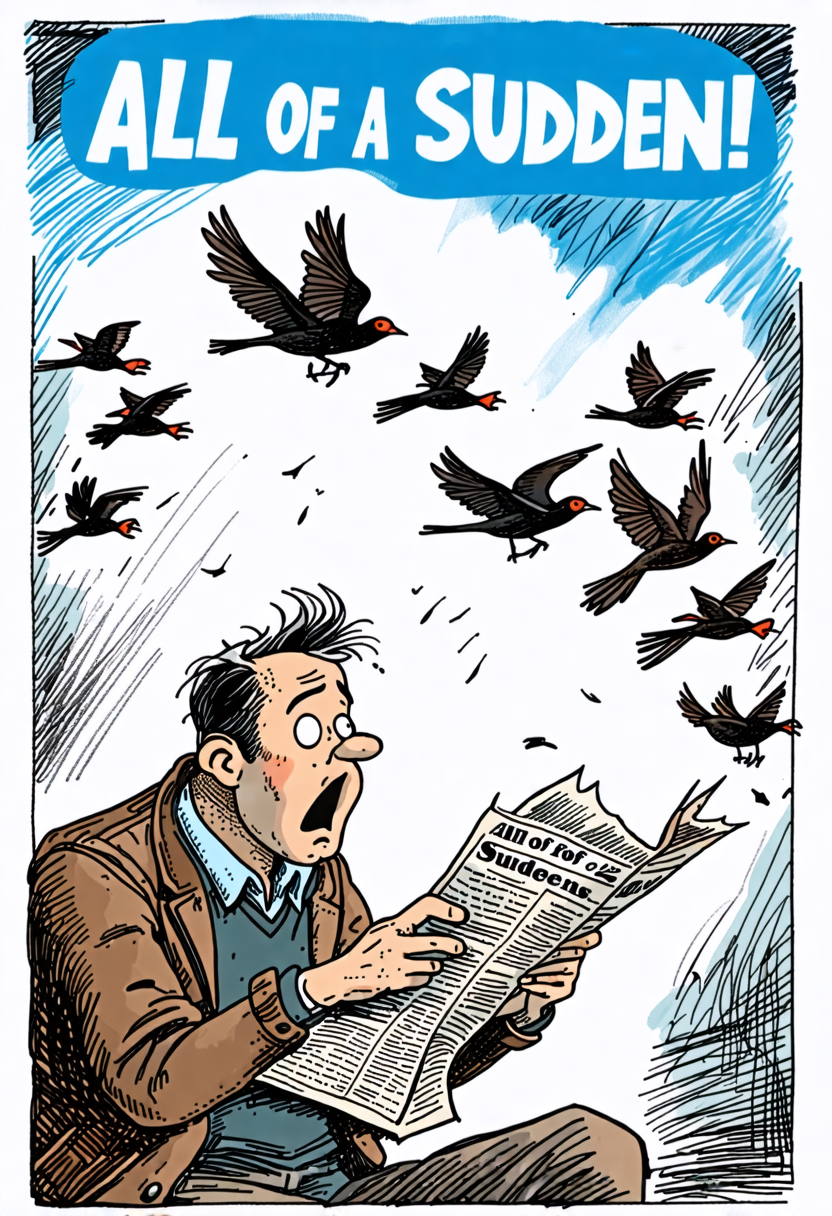All of a Sudden: How to Use It?
‘All of a sudden’ is the correct phrase to use when describing an unexpected event. It emphasizes abruptness, adding drama and immediacy to your writing. Incorrect forms like ‘all of the sudden’ should be avoided. The phrase has historical roots, with early versions such as ‘of a sudden’ and ‘on a sudden’ used by Shakespeare and Defoe. Using ‘all of a sudden’ guarantees clarity and precision, making your narrative more engaging.
Origin of the Phrase
The phrase ‘all of a sudden’ has its roots in English literature dating back to the 16th century. It first appeared in the works of William Shakespeare, who used ‘of a sudden’ in 1594. This early usage highlights the phrase’s longstanding presence in English.
Later, Daniel Defoe used ‘on a sudden’ in 1719, adding another variation to its history. Despite these variations, ‘all of a sudden’ became the accepted form. The evolutionary path of this expression remains unclear, but it underscores a sudden, complete change.
Historical Variations
Early variations of the phrase, such as ‘of a sudden’ and ‘on a sudden,’ reflect its historical evolution. These forms were used by notable writers like Shakespeare and Daniel Defoe in the 16th and 18th centuries, respectively.
Over time, the phrase has morphed into the more common modern usage, ‘all of a sudden.’
Historical Usage: Shakespeare’s use of ‘of a sudden’ in 1594 showcases its early presence in English literature.
Transitional Forms: Daniel Defoe employed ‘on a sudden’ in 1719, indicating a phase of change.
Modern Standard: Today, ‘all of a sudden’ is the accepted form, emphasizing the abruptness of events.
Proper Usage
Proper usage of the phrase ‘all of a sudden’ guarantees clarity and precision in writing. It’s important to use this idiom correctly to convey suddenness effectively. Writers should avoid the common mistake of using ‘all of the sudden,’ which is less formal and often considered incorrect.
The following table highlights the key points for proper usage:
| Correct Usage | Incorrect Usage |
|---|---|
| All of a sudden, it rained. | All of the sudden, it rained. |
| The lights went out all of a sudden. | The lights went out all of the sudden. |
| All of a sudden, the door opened. | All of the sudden, the door opened. |
| He stopped talking all of a sudden. | He stopped talking all of the sudden. |
Usage Examples
Here are several examples to illustrate the correct use of ‘all of a sudden’ in various contexts. This phrase is often employed to convey abrupt changes in a situation or atmosphere.
‘All of a sudden, the sky darkened, and a storm began to brew.’
‘We were enjoying a peaceful picnic when, all of a sudden, a dog ran through our setup.’
- In formal writing:
‘The financial markets were stable until, all of a sudden, unexpected economic data caused a sharp decline.’

Meaning and Emphasis
The phrase ‘all of a sudden’ serves to emphasize the abruptness and completeness of an event. This idiom is used to highlight that something happened quickly and unexpectedly.
The word ‘all’ adds a sense of importance, making the sudden change more pronounced. For example, ‘All of a sudden, the lights went out,’ implies the shift from light to dark was instant and complete. Such phrases are useful in storytelling to capture the reader’s attention and convey a dramatic shift.
Common Mistakes
Many writers mistakenly use ‘all of the sudden‘ instead of the correct phrase ‘all of a sudden.’ This common error can detract from the clarity and professionalism of written work.
Understanding and avoiding this mistake is vital for effective communication.
Here are some points to ponder:
- Importance: Using the correct phrase ‘all of a sudden’ maintains consistency in formal writing.
- Professionalism: Avoiding common errors like ‘all of the sudden’ enhances the professionalism of your text.
- Clarity: Proper usage maintains clear and precise communication, essential for reader comprehension.
Alternative Phrases
Instead of relying on ‘all of a sudden,’ consider using alternative phrases to enrich your writing. Options like ‘abruptly,’ ‘unexpectedly,’ or ‘instantly’ can add variety and maintain reader interest.
For instance, you could say, ‘The weather changed abruptly,’ or ‘She left unexpectedly.’ These alternatives are equally effective in conveying sudden changes without sounding repetitive.
Another option is to use ‘without warning’ to add a dramatic effect, such as ‘The storm arrived without warning.’ By diversifying your language, you enhance the readability and professionalism of your work.
Acceptable Exceptions
In certain contexts, the phrase ‘all of a sudden’ may be especially appropriate to convey a sense of unexpectedness. For example, in storytelling or dramatic narratives, using ‘all of a sudden’ can heighten the tension.
Bruce Lee’s sudden moves thrilled audiences; describing them with ‘all of a sudden’ adds impact. Additionally, in descriptive writing, this phrase can vividly depict abrupt changes.
Some individuals might prefer ‘all of the sudden’ informally, but this should be avoided in formal writing. Understanding when to use ‘all of a sudden’ is crucial to effective communication.
Maintain consistency by avoiding informal phrases and ensuring clarity in your writing. This approach will enhance the overall quality and readability of your text.







